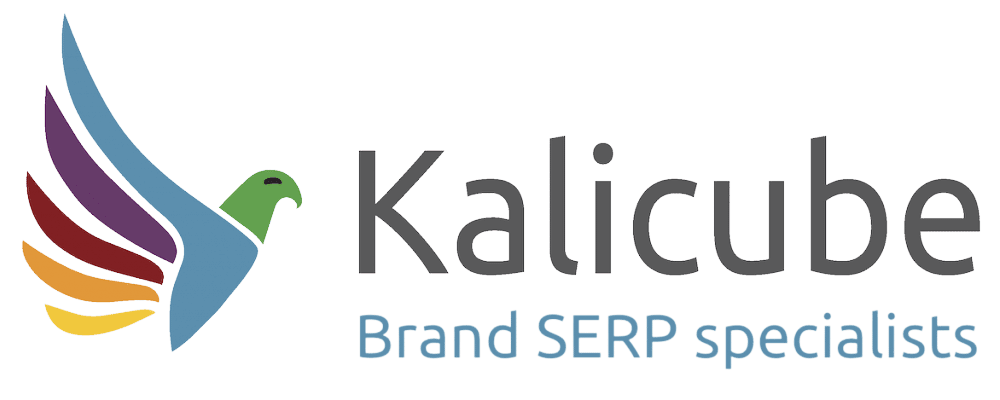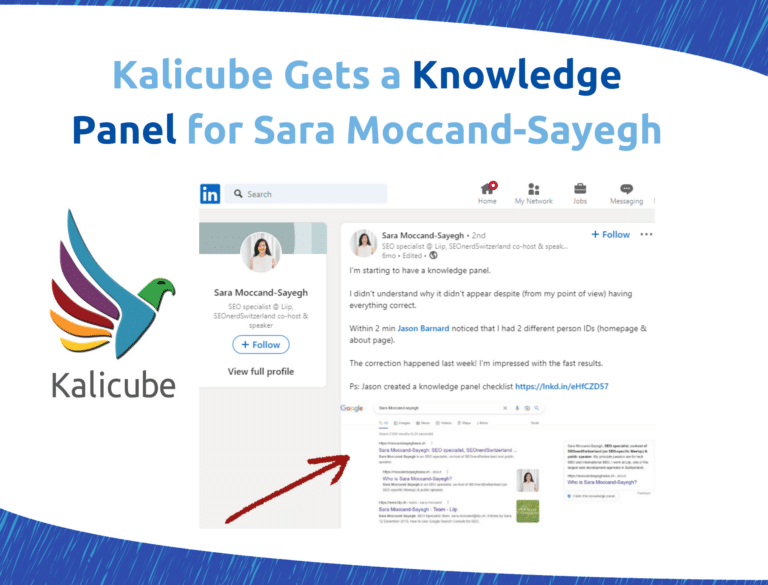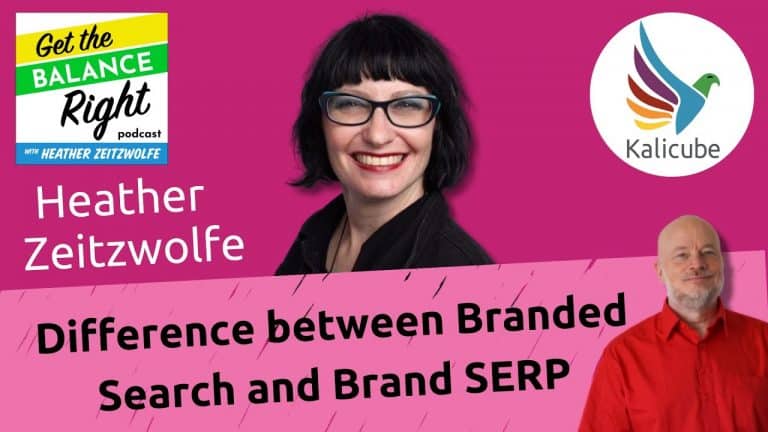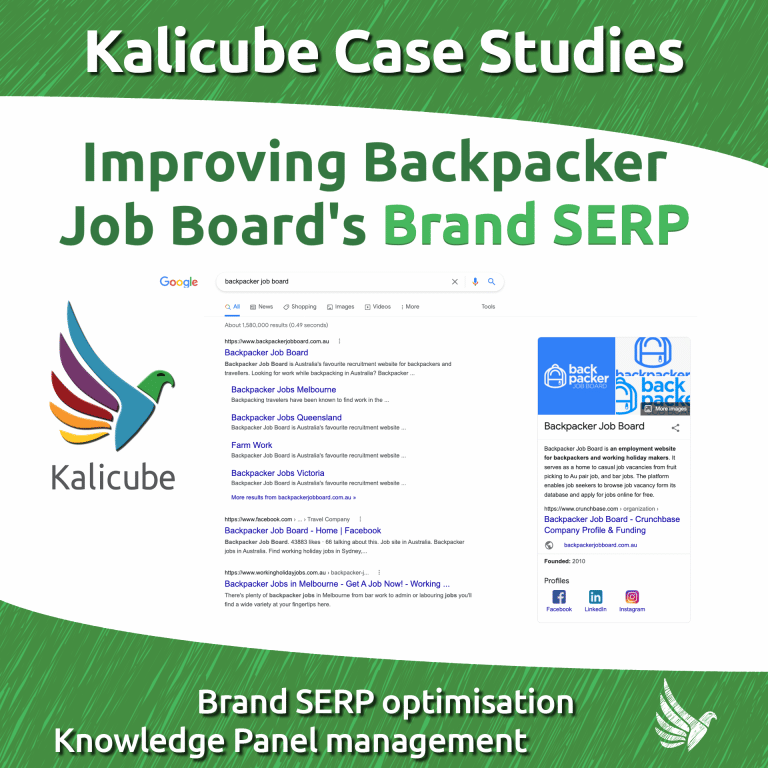How to Change a Subtitle in Google Knowledge Panel – Kalicube Pro SaaS Case Study
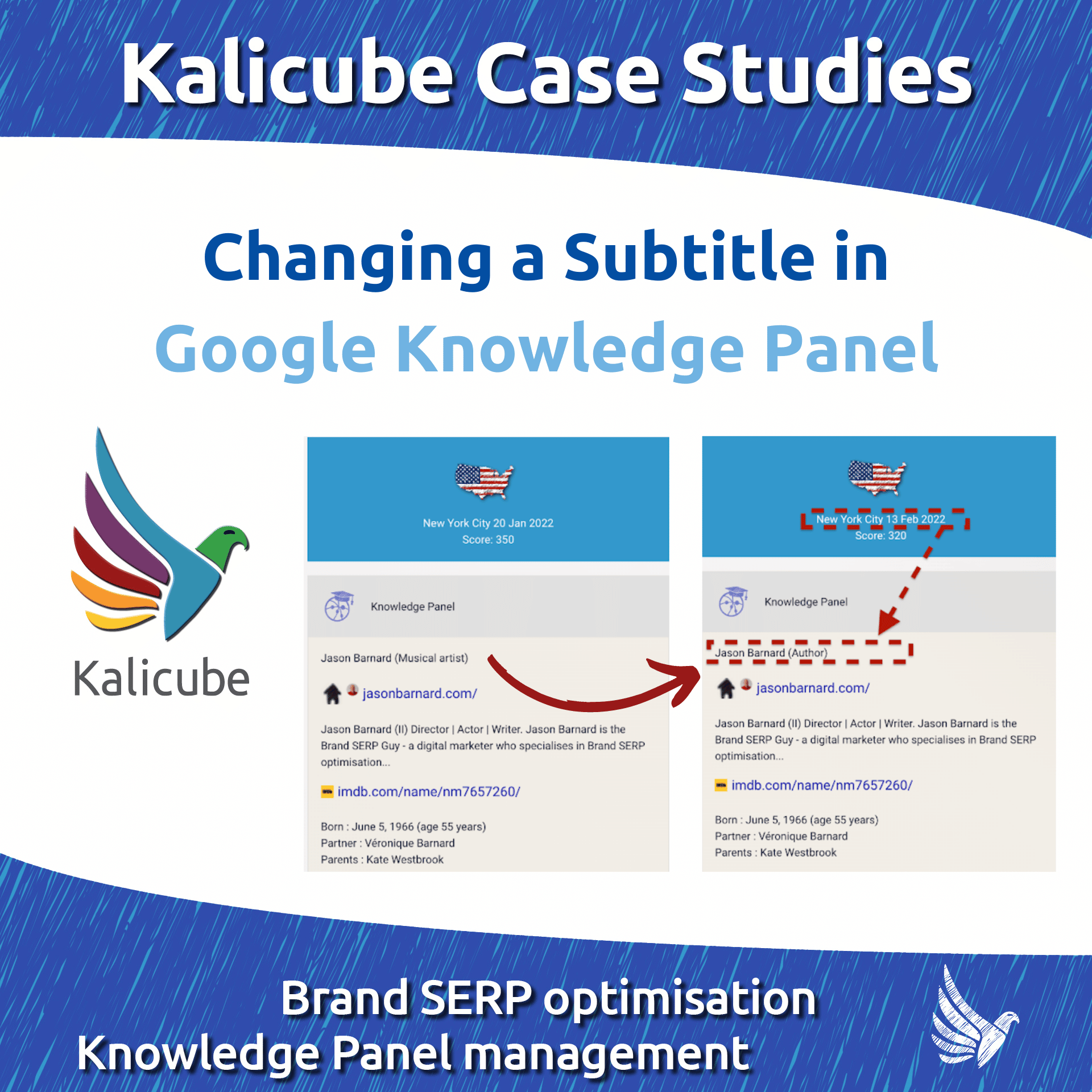
What is a Knowledge Panel?
The Knowledge Panel is on the right-hand side of search results pages on Desktop in Google. They appear when you search for entities (people, places, podcasts, companies, organisations, things) and contain information about the entity that Google considers to be ‘fact’. One common misconception is that Google gets all its facts from Wikipedia. Although Wikipedia is the dominant source and represents a little over 50% of the information in Knowledge Panels on Brand SERPs (what your audience sees when they google your personal or brand name), Google establishes a significant number of facts algorithmically.
Changing any information in a Knowledge Panel is a huge challenge since it involves getting Google’s algorithms to change their evaluation of the facts it has understood.
What is a Knowledge Panel Subtitle?
A Knowledge Panel subtitle is what appears under the entity name. Examples include “Author” for Jason Barnard or “Footwear manufacturing company“ for Nike. The subtitle in a Knowledge Panel describes Google’s understanding of what you do. This is the knowledge that is the solid stone foundation of your Entity Identity in Google’s “mind” and is therefore phenomenally important. In fact, no other piece of information is more important since it represents your sphere of expertise in Google’s mind.
That understanding feeds directly into which audience Google believes you can serve, your “raison d’être” as a company (or person, or podcast…), E-A-T and Topical Authority. Changing a subtitle in a Knowledge Panel on Google means that you are changing its fundamental understanding of what you do and which audience you might potentially serve. Which hits right to the heart of every single search result you appear in.
Three Options for Changing a Knowledge Panel Subtitle From Musician to Author
Changing Information in a Knowledge Panel Using the Feedback Button
The most common approach is to claim the Knowledge Panel and then use the feedback link to ask a human being at Google to change the subtitle. You might think that the feedback button on the Knowledge Panel would be the best option for this change. However, a subtitle is 100% driven by algorithms: Google employees cannot change this information. That seems strange, we know. However, it is clear that every single aspect of Google’s algorithms is not human-driven. In Knowledge Panels, this is especially true.
In short, in this case, the human is not in the loop – you have to convince the machine.
That isn’t to say that you shouldn’t use the feedback button for the items in the Knowledge Panel humans at Google can currently change (the list is here). When you do this, make sure you provide substantial third-party references that confirm the veracity, and that other important sources don’t contradict.
To reiterate – for the subtitle, the feedback button does not work and is not an option. Read on…
Changing Information in a Knowledge Panel Using Wikipedia
If an entity is notable enough to have a Wikipedia article, then making a change in the first sentence of that article to define the subtitle can sometimes be enough. If there was an article on Wikipedia for Jason, he could have changed the first sentence from “Jason Barnard is a musician and a digital marketer” to “Jason Barnard is an author and digital marketer”, and that might have been enough. This is a neat trick if you can play it. However, although it was almost always a successful tactic 5 years ago, it works less and less often and can no longer be relied upon.
Changing Information in a Knowledge Panel Using Weight of Proof on the Open Web
The weight of proof on the Internet needs to clearly indicate that the information you want to show in your Knowledge Panel is accurate. Changing that weight of proof is the toughest option, but also the best long-term solution both because it will “stick” (since the algorithms have autonomously established this as fact, and they have the final say), but also because it requires a sustained strategy that better defines the Entity Identity, naturally improves the Entity’s digital ecosystem and cleans up its digital footprint.
And the weight of proof isn’t as simple as it might at first appear. The volume of proof is one thing. Timeframe, source hierarchy and authoritativeness all play a major part in the algorithm’s evaluation.
Jason Barnard’s Knowledge Panel Musician Subtitle
Jason Barnard had a 20-year career in music. Not “fame-worthy” successful, but incredibly well documented online over a long period of time on authoritative sources.
That means, despite his lack of popular success, the weight of evidence that Google’s algorithms see suggests VERY strongly that he is a musician. Sources such as MusicBrainz, IMDB, Spotify, Discogs, Deezer, Amazon… and even his own website.
So, Jason’s subtitle in his Knowledge Panel has been “Musician” for a long, long time and overcoming this weight of evidence online was a major challenge in the subtitle switch. In September, Jason started writing a book – The Fundamentals of Brand SERPs for Business – and part of the motivation was to see if he could change that subtitle to “Author”.
Not Using Google Books to Make the Change
Google has its own authoritative source, Google Books, and publishing a book there is a surefire signal to Google that you are an author.
So that is the easy solution. Of course, Jason set himself up for an additional challenge in trying to achieve his goal of changing his subtitle without the help of Google Books. That was partly for the challenge and partly for control. If you rely on a source like Google Books that has a uni-focus then you are 100% reliant on that and “stuck in a rut”. Here, Jason wanted to see if one can avoid reliance on one single restrictive source.
What Subtitle to Aim for? Author or Digital Marketer?
Originally, Jason thought about changing his subtitle to “Brand SERP Digital Marketer” instead of “Author”, but there are problems that play heavily into the choice of target for the subtitle.
- Google will only put what it considers to be “facts” in a Knowledge Panel, it will not show information it was not very sure about.
- Google relies heavily on industry-standard human-curated databases
- Subtitles in Knowledge Panels are limited to a closed list. Inventing your own subtitle is not an option.
“I initially thought about Brand SERP Digital Marketer as a subtitle, but that would have been doomed to failure since the subtitle is not in Google’s closed list, and also in an industry like digital marketing, Google doesn’t have an authoritative and reliable human-curated database to refer to… convincing Google is easier in industries where there are dedicated databases like MusicBrainz, IMDB, Spotify, Amazon, Google Books, Google Podcasts and so on.”
Jason Barnard (The Brand SERP Guy)
Google’s understanding of Jason was founded in his presence in many authoritative databases for the music industry that have existed for over a quarter of a century. That means Jason needed to build equivalent (or more convincing) corroboration on a similar authoritative set of sources. In the digital marketing space that is simply not possible since Google doesn’t currently recognise enough authoritative sources in that industry.
From that perspective, Jason realised that “Author” is more likely to succeed, since Google has a standard term, and can rely on trusted human-curated databases such as Goodreads, Amazon and even its own, Google Books. The same doesn’t apply to a “Brand SERP Digital Marketer”.
Updating Corroborative Sources and Utilising Semantic Triples
The trick is simple: update or create the sources Google sees as authoritative in the sphere you are looking to move into. And ensure that each and every one contains the same structured information and/or uses the same semantic triple. So the two huge questions are: what do I need to add to the authoritative sources and which sources.
Starting with “what do I need to add”. First is that on every page that describes Jason, he updated the subtitle. But that is not always possible (many sites don’t offer a subtitle as an option)
Trick #1 is the Semantic Triple (surprisingly powerful).
For example, the components of a triple in the statement “Jason Barnard is an author” consist of a subject (“Jason Barnard”), a predicate (“is”), and an object (“an author”).
So, the most important first step is to change the start of Jason’s bio description on his own website with the correct Semantic Triple at the beginning. “Jason Barnard is an author and a digital marketer who specialises in Brand SERPs and Knowledge Panels.” rather than “Jason Barnard is a digital marketer who specialises in Brand SERPs and Knowledge Panels.”
Step 2 is to update all the profiles with that same semantic triple. Do this as fast as you possibly can (in a day if possible which is what Kalicube Pro is designed to do). When that description changes within a day across the entire web, then Google gets a clear signal and it takes notice. When that information updates over several weeks, then the signal is vastly diluted.
Step 3 is to add more on sources Google perceives are authoritative in the industry. Jason used Kalicube Pro since we have identified the Knowledge Panel Sources Google uses (this list changes frequently as Google updates its algorithms).
These simple changes, if done concurrently (in less than a week), deliver a massive signal to Google… and that triggers the change in understanding we are looking for: Jason is no longer a musician but an author instead.
“If you write Bob Smith is a musician and an entrepreneur, Google will tend to think you’re primarily a musician because that’s the first thing you said. The way I learned that was by playing with Wikipedia. I had a Wikipedia article and I switched that first phrase and in 30 minutes, Google switched my subtitle. That semantic triple is much more powerful than most people realise.”
Jason Barnard (The Brand SERP Guy)
Google Doesn’t Heavily Rely on Wikipedia Anymore
Editing a Wikipedia article led to Jason’s discovery, but that was three years ago and things have changed: Google no longer relies as much on Wikipedia. It has expanded its learning and deepened its research to the point where it looks for informative and factual sources based on entity type, geo-location and industry (at Kalicube we call this an Entity Equivalent).
It used to be enough to simply edit your Wikipedia page for Google to make the change, but now you have to change every single profile and webpage that is relevant in your geo and industry. You need to have the same information on every source Google is paying attention to within your industry to avoid confusion. If you can rapidly provide a consistent change across all relevant sources, Google will happily change the subtitle for you.
“Wikidata and Wikipedia are both very strong signals, but simply correcting those is not necessarily enough. ANd I would never recommend relying purely on those for yany aspect of a Knowledge Panel. You need to change every relevant reference to you. In my case, I changed every description about me from Jason Barnard is a musician and digital marketer to Jason Barnard is an author and a digital marketer. And I did that in less than three hours. The repetition around the web is incredibly powerful. But it was the consistency of that change on the same day that made the switch to the new subtitle in my Knowledge Panel so seamless.”
Jason Barnard (The Brand SERP Guy)
Using Kalicube Pro SaaS to Speed the Process Up
If you want to change every profile and major mention you have online, then you will need to start by creating a list. This list is called a Digital Ecosystem which basically includes everything online about and around your brand.
The compilation can be done manually through research and spreadsheets. But finding every single profile and major mention you have online is a very tedious and boring job.
Kalicube Pro does that job for you in just a few minutes. We tried identifying all major references to an entity manually to see just how much time Kalicube Pro saves. Manually, it took 12 hours to find 42 profiles. In addition, it took 3 hours to organise in a spreadsheet, and update those 42 profiles with the new subtitle.
With Kalicube Pro’s Classification Tool it took 10 minutes to find all the major references (data sources, profiles, reviews and articles) and only took 2 hours to update them! That is a phenomenal time saver. Plus, Kalicube Pro finds 50% more profiles and articles – in this case, 61 profiles, as opposed to the 42 found manually.
“What Kalicube (Pro SaaS) did was present me with a prioritised list of 61 knowledge sources that Google is using for my entity. To switch my Knowledge Panel subtitle, I just clicked on each one in the list, corrected the information on the page, clicked on the next one, corrected that, clicked on the next, and corrected that … it took me two hours in total – an afternoon on January 20th 2022 (coincidentally my sister’s birthday).”
Jason Barnard (The Brand SERP Guy)
A more detailed case study [insert link] was conducted to show the comparison between two methods for compiling a list of knowledge sources Google uses for a named (specific) entity.
When you look at the numbers, it’s clear that the time you need to spend and the quality of the results obtained with a manual search pales in comparison to what Kalicube Pro SaaS does in just a few minutes. This phenomenal tool saves you days of (very) tedious work that, frankly, is a headache.
Kalicube Pro SaaS also Automatically Ranks the Results According to Google Importance
The full result set that Kalicube Pro SaaS found for Jason Barnard was 500, but its algorithm automatically filters out the results about other Jason Barnards, excludes the sources that are not used by Google for “our” Jason Barnard and prioritises the list according to the relative importance to Google of each source. This ensures that you spend your (valuable) time working on only the sources that will make a difference and start with the most important sources.
Three Weeks Later his Knowledge Panel Subtitle Changed (as Expected)
Jason Barnard changed all of his profiles from musician to author in one afternoon on January 20th 2022.
Using Kalicube Pro’s Historical Brand SERP Tracker, we can see that Google changed his subtitle on February 13th.
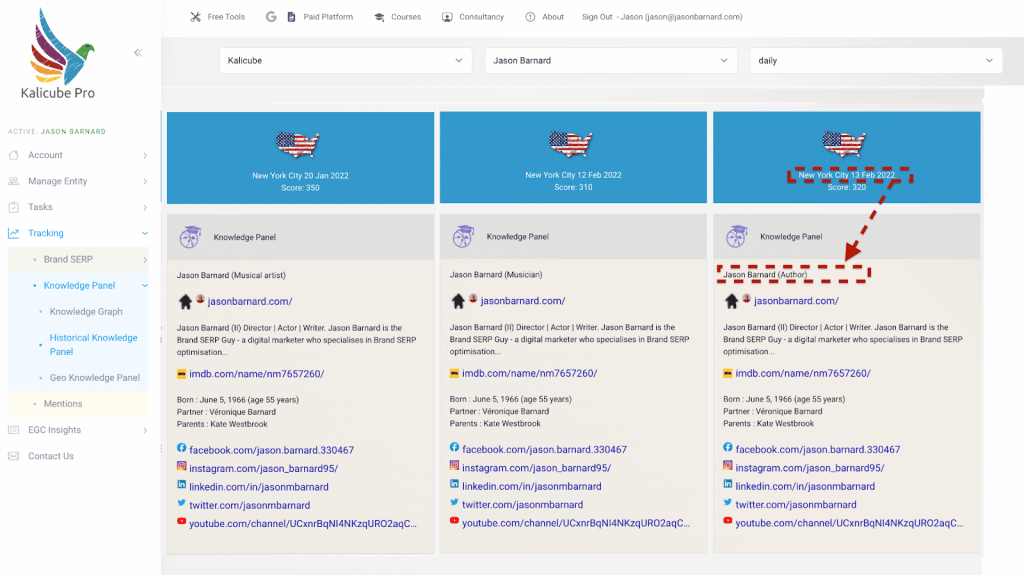
Simultaneous Switch in All Sources is Key
In the past, Jason has updated subtitles for clients. He used the manual method for collecting and correcting the sources and, because of the client interaction, the work was generally spread over one to three months. Using this process, the switch in the Knowledge Panel subtitle used to take between 4 and 6 months.
The key here is that Jason made the change simultaneously on all the important sources Google was using for factual information about Jason Barnard. This meant Google saw the same corroborative information across its entire “knowledge landscape” for Jason, making the switch quick, clean and (importantly) permanent.
Further, in some past cases, Jason has seen the subtitle toggle back and forth between the old and new subtitles. In some cases, this behaviour can continue for months. Once again, changing all the key knowledge sources simultaneously prevented this behaviour.
Saved the Time and Effort to Compile a Digital Ecosystem
It took 15 hours to manually compile Jason’s Digital Ecosystem and update the data. With Kalicube Pro SaaS, on the other hand, it took a little over 2 hours in total – more than 7 times faster.
“Without Kalicube Pro, even if you focus only on that, compiling this list will take you about 2 to 3 days. Then sorting through it, classifying it will take you perhaps another day, and then updating them all will take you another half a day, so you’re looking at almost a week’s worth of work. Whereas here, if you track your digital ecosystem and maintain it over time on Kalicube Pro, you can change almost anything you want about Google’s algorithmic understanding of you in an afternoon.“
Jason Barnard (The Brand SERP Guy)
Proved that It Was Possible to Change Google’s Understanding of Who You Are
Considering that it can be quite difficult to change Google’s mind once it understands who you are, this experiment has proven that by providing concrete and consistent information, change is possible. This opens a path for possible experiments in the future to see how much we can influence and how easy it will be to change Google’s algorithmic perception and representation of any aspect entity.
Won the Challenge of Not Utilising Google Books
Since Jason’s additional challenge was not to take the easy way out and use Google Books, he has proven that publishing a book through Google Books is not absolutely necessary in order to be perceived as an author by Google.
His book “The Fundamentals of Brand SERPs for Business” has since come out on Google Books and that is now reflected in his Knowledge Panel. The effect this had on Google’s algorithmic understanding of Jason Barnard is a whole story in and of itself… for another day 🙂
Using Kalicube Pro SaaS Shortens the Process from Six Months to Three Weeks
To get a complete list of profiles for your client, you will have to search more or less the entire internet, and even that might not be enough, forcing you to contact your client again, which usually leads to multiple back and forths, ultimately increasing the time spent on this supposedly simple work.
Given the practicalities of working with a client, this process often takes place over a three-month period and you make the changes gradually with each new profile you find, Google will be confused by the conflicting information it sees over that period. It would not fully understand it, and without that understanding, it will take longer for Google to confirm it and be confident enough to make the change. Depending on the entity, your prioritisation of the sources and the speed of your work it can take four, six or even 12 months for Google to change its algorithmic understanding of you.
On the other hand, when the important sources are all changed in one afternoon when Google crawls all those pages over the next few days, it will find the phrase “Jason Barnard is an author” in one source, and then again on the next source, and then again on the next, and so on… By confirming this multiple times and making the change at the same time, Google will quickly and confidently understand that Jason Barnard is now an author.
Gaining Control Over Knowledge Panels Can Be Easy
While it’s obvious how important it is to gain control of your Knowledge Panel as it is very visible on your Brand SERP (the search result for a search on your name) and dominates the right-hand side of your Brand SERP, changing information in Knowledge Panels is often overlooked as it is quite a lengthy, complex, and slow process considering how long it can take Google to gain a full understanding of the entity through all corroborating sources to it.
Google tends to be stubborn and either not change, toggle back and forth or sometimes revert the information back to its previous state, undoing all your previous efforts.
“I’m incredibly pleased with this part of the Kalicube Pro platform: not only does Kalicube Pro vastly reduce this stubbornness, but it also provides you with a tool that removes the incredibly boring grunt work, and provides data-driven priorities that truly do move the needle for you.“
Jason Barnard (The Brand SERP Guy)
Not Just the Knowledge Panel
It is important to bear in mind that the Knowledge Panel is the visible representation of Google’s understanding of your entity. The Knowledge Graph that underlies Google’s fundamental understanding is also affected here.
So this power to change Google’s algorithmic understanding (Entity Identity) is not only vital for your Google Business Card but also for how Google represents your brand whenever it appears in the SERPs, Entity Optimisation, your E-A-T and therefore all your SEO efforts.
List of all gains:
- Managed to change his Knowledge Panel subtitle in three weeks.
- Saved the time and effort it takes to compile a manual digital ecosystem.
- Proved that it was possible to change Google’s understanding of who you are, even if it is incredibly confident in its current understanding.
- Proved that Google’s Knowledge Panels are not solely reliant on Wikipedia and its own sources (in this case Google Books)… the weight of proof on other sources can do the job.
There are many more ways Kalicube can help you manage your Knowledge Panel. To learn more, you can sign up for either of our courses or our SaaS platform: Kalicube Pro!
